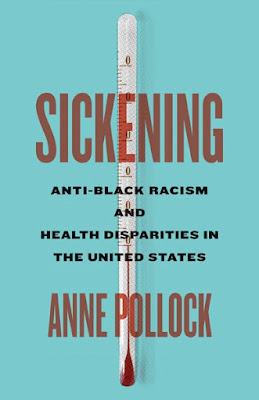 |
| Buy from UMN Press |
Racism is embedded in systems, structure and institutions in the United States. Nowhere else is its effects more profound and prolific than in systems of public health, healthcare and environmental justice. In Sickening: Anti-Black Racism and Health Disparities, Professor Anne Pollock illustrates through case studies the pervasive and precarious intersection of racism against Black Americans with social determinants of health.
 |
| Anne Pollock |
The book is an important teaching tool for students of various disciplines to take a critical view of individual stories that have implications for social justice. Pollock focuses of 21st century issues that impact the lives of Black Americans, through the lenses of the war on terror, mass incarceration, unnatural disaster, environmental racism and reproductive justice. Black mail workers were exposed to anthrax shortly after the 9/11 tragedy. Hurricane Katrina claimed the lives of almost 2,000 people and displaced thousands of majority Black residents. The children of Flint, Michigan were subjected to drinking lead-contaminated water for years, without proper resolution. Tennis superstar Serena Williams discussed her difficulty getting the help she needed after the birth of her child.
Each case offers ample evidence of differential and inequitable treatment of Black Americans, highlighting that the scourge of racism is not in the distant past, but continues to afflict Black communities in the present day. Pollock, a professor of social medicine and global health, raises the question of citizenship and “racialized biopolitics,” shining light on whose lives are valued and whose lives are disregarded.
Pollock offers an analytical tool to examine how racist systems cause persistent health disparities. The analysis template allows one to identify a particular example of social injustice, and invites the reader to apply the frames of institutionalized, personally mediated and internalized racism. She also challenges the reader to expand their analytical frame by delving deeper into historical, economic, intersectional and other contexts.
Pollock began writing the book before the COVID-19 pandemic exposed the vulnerabilities of Black communities during a global pandemic. She discusses the twin crises of the pandemic and social uprising that erupted from the tragic and senseless murders of George Floyd, Breonna Taylor and Ahmaud Arbery at the hands of police and right-wing vigilantes. Pollock’s examination of the depth of interlinking social injustices that harm Black communities is much needed during this time, as we continue to grapple with the continuing public health crisis. This book offers us the tools to think and act critically about workable solutions, as we recognize injustice and realize our part in dismantling systems of inequities.